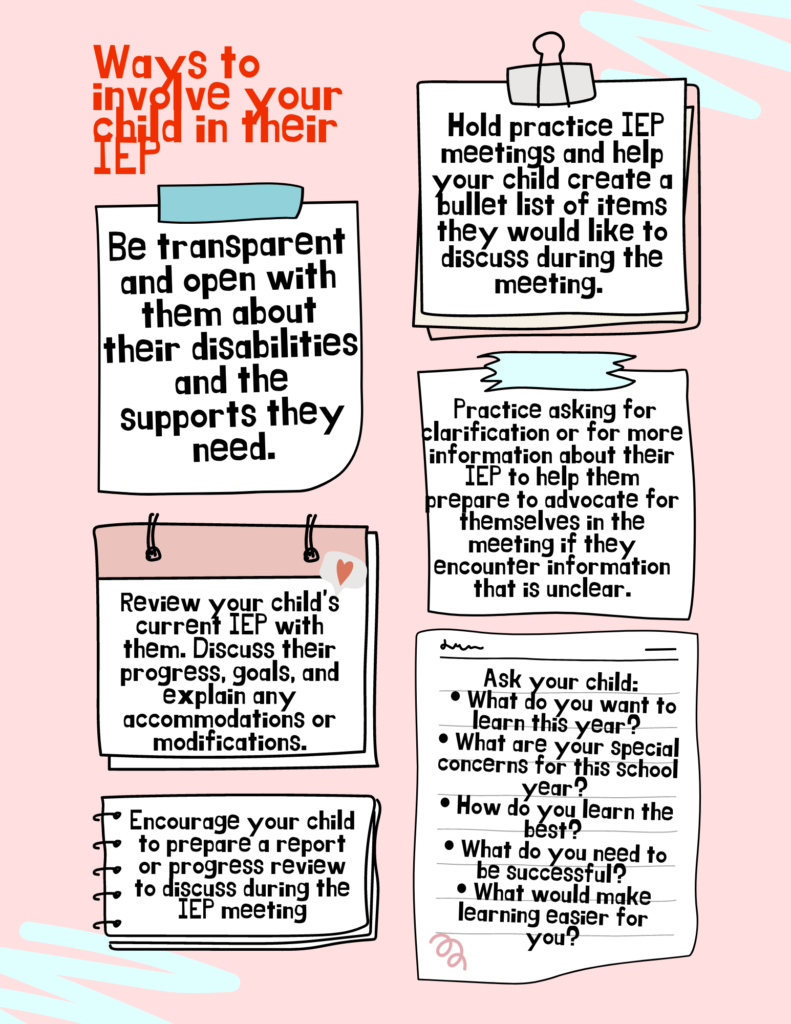 When should I invite my child to attend their IEP meetings?
When should I invite my child to attend their IEP meetings?
The Individuals with Disabilities in Education Act (IDEA) states that students should participate in their IEP meetings “whenever appropriate,” but does not specify an age due to the diverse needs and readiness levels off students. However, IDEA does mandates inviting a student once the meeting takes a sharp focus on transition planning, beginning at 14. While the invitation is compulsory, the child’s attendance is not. Experts suggest that involvement in their IEP, building the foundation for self-advocacy as early as elementary school, with the benefit of teaching your child essential skills for their future. The short answer is: whenever you as a caregiver believe your child is ready.
The advantages of involving your child in their IEP meetings extends beyond the educational sphere. Not only does it empower your child to begin actively engaging in shaping their education, but it also demystifies the process unfolding “behind the scenes.” Your child can become an active contributor, offering firsthand feedback on the effectiveness of their accommodations and services. This involvement also fosters the development of self-awareness, as your child learns to articulate their strengths and weaknesses while understanding the purpose of annual goals and their measurements.
Guiding your child’s participation in IEP meetings requires preparation. Some children may simply attend and listen, an act of self-advocacy itself. As they mature, their contribution grows to become more substantial, particularly when discussing successes and struggles. Transition planning ushers in a more active participation phase, as children begin goal setting and envisioning their post-graduation path.
Engaging in exploratory conversations is key—parents and teachers should create an environment where children reflect on their strengths, weaknesses, and needs. Elementary-aged children can discuss what they enjoy, their challenges, and what works for them in class. Middle school students should begin understanding barriers to success and expressing their own needs. High school students, expected to participate fully, should also be prepped for discussing transition plans. By actively participating, children gain confidence and a profound understanding of their strengths and challenges. This approach enhances goal setting, teamwork, and conflict resolution skills. Moreover, it fosters self-determination, enabling them to grasp their disabilities’ impact and confidently request help when needed.
Active engagement in the IEP process can yield remarkable gains in your child’s functional performance. Improved social competence, communication, personal management, behavior, and self-determination are just a few of the benefits. Children leading their IEP meetings display ownership in implementing goals and shaping their education. These self-determination skills expand to encompass self-esteem, assertiveness, decision-making, and problem-solving, positioning them for success beyond the classroom.
Empowering your child from an early age with self-understanding and the ability to leverage their strengths is a collaborative effort. Parents and teachers play critical roles in supporting a child’s journey toward self-advocacy. By recognizing the importance of their active involvement in IEP meetings, children forge a path toward a successful adulthood empowered by their unique capabilities.
